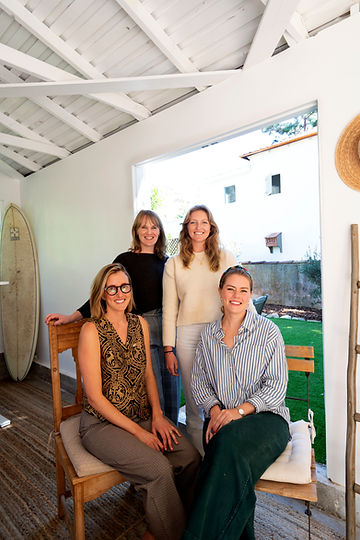
Santa Barbara Entrepreneurs Launch Beni, a Browser Extension for Secondhand Shopping
Company’s Goal Is to Make Resale Seamless from Start to Finish
Secondhand shopping is more popular than ever thanks to fast fashion, rising costs of living, and social media trends. But digging through the racks at thrift stores or searching across resale sites can be time-consuming and fruitless. That’s where Beni comes in: a free browser extension that makes secondhand shopping easier by offering users comparable products for a fraction of the price. Based in Santa Barbara, the company launched in September and is led by S.B. natives Sarah Pinner and Ryan Shand, UCSB Bren School alum Celine Mol, and new resident Kate Sanner.
Think of the Beni extension like a personal online shopper. Once the extension is downloaded, the user navigates to the web page for the item they’d like, clicks the Beni icon in the bottom right corner, and receives a selection of secondhand alternatives. The user can create a profile to input their size, set the platforms from which they prefer to shop, and soon will be able to list their own items to sell from their closet. Beni’s goal is to make resale seamless from start to finish.
“There’s no stigma around shopping secondhand,” Pinner said. “In fact, people almost feel embarrassed not to do it. But there hasn’t been a tool to actually help you.”
Originally envisioned in 2020 as Pinner’s thesis project, Beni is the first to marry technology and partnerships with leading resale marketplaces. The software features artificial intelligence that combs the world’s largest catalogs of online aggregated resale. Beni currently partners with companies like The RealReal, Rent the Runway, Vestiaire Collective, eBay, and Kidizen.

The company hit its beta metrics in August and is now in its second round of seed funding. This quarter, the team’s focus is expanding their customer base and converting downloads to successful purchases. Shand is focusing on securing more partners, Sanner is building a campus ambassador program to create a market among college students, and Mol is collecting data and fine-tuning the software to be even more intelligent and adaptive to users’ behavior. “We’re going to build our own version of a TikTok algorithm that will just know you so well,” Mol half-joked.
“We want Beni to be the welcoming party to secondhand shopping,” Sanner explained. That winsome ethos permeates the young company’s culture. Pinner, Mol, Shand, and Sanner didn’t know each other before becoming the executive team of the company, but you would never guess it from the way they finish each other’s sentences explaining the circular economy, or tossing out ideas about a Beni van tour. The four share backgrounds in the corporate sector or startups, see waste as a design flaw, and value progress over perfection as a guiding principle for their work. The company is proudly women-owned, remote-first, and holds its offsites in Santa Barbara at places like the Dart Coffee garden and Kiva Cowork.
Beni is also tapping into the increasing environmental consciousness of consumers. Mol referenced a report from McKinsey & Company: If just one in five garments is traded through circular business models, buyers could make a large dent in reducing fashion-related emissions.
When asked about the state of the re-commerce industry in Santa Barbara specifically, the team listed mostly strengths. “I think people by default care about the environment because they’re more in the environment,” Shand said. “I think you just have to search a little harder. There are fun community events like pop-ups selling secondhand clothing, and there are startups in town such as Apeel [Sciences] that also see waste as a design flaw.”
If you’re interested in secondhand shopping in Santa Barbara, be sure to check out Crossroads Trading Company, Lazy Eye Shop, The Closet, Farmer & the Flea Market, Westward General, and The Blue Door.

